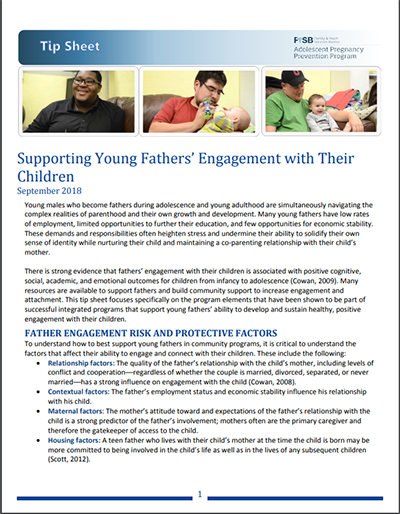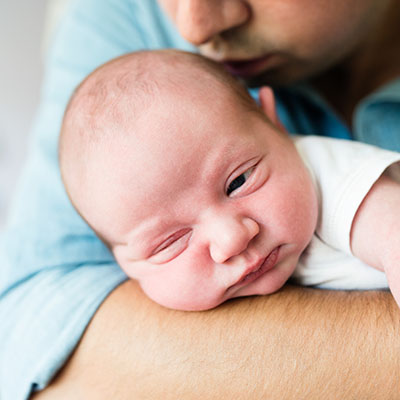Beyond the Literature: 4 Things Young Fathers Have Taught Me
By BA Laris, MPH | April 2, 2019
Program Manager, ETR
“I was 14 and I just didn’t know…”
Many of us work with teens who face challenges because they didn’t have health information and resources they needed. We put a lot of effort into gathering our own information about their circumstances so we can offer them the best support possible.
But what do you do when you don’t know? Sometimes people go to Webster’s for a definition. Sometimes they go to Wikipedia in an effort to understand information, ideas or complex problems.
New Tip Sheet: Supporting Young Fathers' Engagement with Their Children

The tip sheet includes a discussion of risk and protective factors for father engagement, effective program elements for interventions that work, tips for programs that want to begin working with young fathers and a list of resources for young fatherhood programs.
At ETR, we like to go to the science and literature. But on some topics, the literature is scarce. Then where can we go?
Go to Individuals
To promote health equity, we really want to understand the nuances of human behavior. Whether we’re a researcher, trainer, policy person or direct provider, we work to understand people’s lived experiences. ETR, in collaboration with Children’s Hospital Los Angeles and the Family Youth Services Bureau (FYSB) has been working for some time to better understand the lived experiences of young parents, both the mothers and fathers, and to discover better ways to support them.
There is not much in the research literature on young mothers and even less on young fathers. By combining a literature review with in-depth qualitative interviews with young fathers, we have added to our understanding of this group.
Beyond the Literature
Here are four things young fathers have taught me about their lived experience.
- “I didn’t think she was going to get pregnant. Kinda didn’t want to be a father but it just happened.”
Young men who become fathers during adolescence and young adulthood are navigating both the complex realities of their own growth and development, and the new demands of parenthood. These can be completely distinct processes, but sometimes there is an overlap that surprises everybody—babies, mothers, grandparents and the fathers themselves.
- “My baby is the reason why I got my life straight and I want to buy her a car cuz with my parents they never had money and there would be months where we didn't have water and I don't want her to experience what I went through.”
 Many young fathers have low rates of employment, limited opportunities to further their education, and few opportunities for economic stability. Despite this, they often have a powerful desire to provide an economically stable upbringing for their children.
Many young fathers have low rates of employment, limited opportunities to further their education, and few opportunities for economic stability. Despite this, they often have a powerful desire to provide an economically stable upbringing for their children.
- “The only thing that gets in the way of being a good father is not really being able to go to school and give my kids the life that I want them to have.”
The demands and responsibilities of young fatherhood often heighten stress and undermine young fathers’ ability to solidify their own sense of identity. It can be difficult for them to do the developmental work of identity formation while simultaneously maintaining a co-parenting relationship with their child’s mother and nurturing their child.
- “Being a good father is always being there for your family and significant other as well. Family always comes first, and you will know how to love and care for your children.”
There is strong evidence that fathers’ engagement with their children is associated with positive cognitive, social, academic, and emotional outcomes for children from infancy to adolescence. Understanding young fatherhood and supporting young fathers can have powerful and positive impact on their children.
New Tip Sheet: Supporting Young Father’s Engagement with Their Children
There is a new tip sheet available from FYSB’s Adolescent Pregnancy Prevention Program, The Exchange. “Supporting Young Fathers’ Engagement with Their Children” provides an overview for organizations interested in supporting young fathers’ ability to develop and sustain healthy and positive engagement with their children. ETR assisted in the development of this resource.
These young men’s stories are important. I hope you’ll take the time to listen.
BA Laris, MPH, is a Program Manager and Research Associate with ETR. Her work experience includes program planning, management and evaluation in the areas of HIV/AIDS, substance use prevention and treatment, and international health. She can be reached at ba.laris@etr.org.





